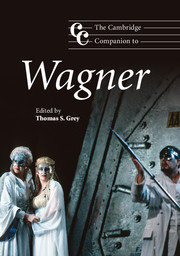Book contents
- Frontmatter
- PART I Biographical and historical contexts
- PART II Opera, music, drama
- PART III Ideas and ideology in the Gesamtkunstwerk
- 10 The urge to communicate: the prose writings as theory and practice
- 11 Critique as passion and polemic: Nietzsche and Wagner
- 12 The Jewish question
- PART IV After Wagner: influence and interpretation
- Notes
- Select bibliography
- Index
11 - Critique as passion and polemic: Nietzsche and Wagner
from PART III - Ideas and ideology in the Gesamtkunstwerk
Published online by Cambridge University Press: 28 September 2011
- Frontmatter
- PART I Biographical and historical contexts
- PART II Opera, music, drama
- PART III Ideas and ideology in the Gesamtkunstwerk
- 10 The urge to communicate: the prose writings as theory and practice
- 11 Critique as passion and polemic: Nietzsche and Wagner
- 12 The Jewish question
- PART IV After Wagner: influence and interpretation
- Notes
- Select bibliography
- Index
Summary
“I cannot say by what means I might ever enjoy the purest radiant happiness other than through Wagner's music: and that even though it by no means always speaks of happiness, but [also] of the terrible and uncanny subterranean powers of human activity, of the sorrow contained in all happiness and the transience of our happiness; the happiness that issues from this music must have to do rather with the way it speaks.” Thus wrote Nietzsche in an unpublished fragment from the summer of 1875.
“Happiness” (Glück): the word occurs no less than five times in this one sentence. This was written at a time when Nietzsche had already begun to distance himself from Wagner in many ways. All the same, that music – as Thomas Mann wrote in his 1933 essay “The Sorrows and Grandeur of Richard Wagner” – was the “great love and passion of Nietzsche's life.” Yet Nietzsche's love was not for the music alone; it was just as much for Richard Wagner the person, the “old magician” as he repeatedly called him. “I loved him, and none other.” That comment, all the more remarkable for its lapidary formulation, was written in the spring of 1885, two years after Wagner's death.
For more than a century a dense thicket of legends and rumors has continued to grow up around Nietzsche’s relationship to Wagner. The many unpublished writings and fragments – which have only recently become available in a reliable, unexpurgated edition (that of Colli and Montinari) – indicate that the “break” with Wagner was hardly so rigorous as it has long been represented, based on an insufficient knowledge of the documentary sources. The younger Nietzsche’s attitude toward Wagner intertwined passion with critique, just as passion is merged with polemics in the later writings. That is why Mann could perceive the late polemics as really “a panegyric in reverse, another form of eulogy.”
- Type
- Chapter
- Information
- The Cambridge Companion to Wagner , pp. 192 - 202Publisher: Cambridge University PressPrint publication year: 2008

